中职英语拓展模块教案第十五周
- 格式:doc
- 大小:167.00 KB
- 文档页数:7
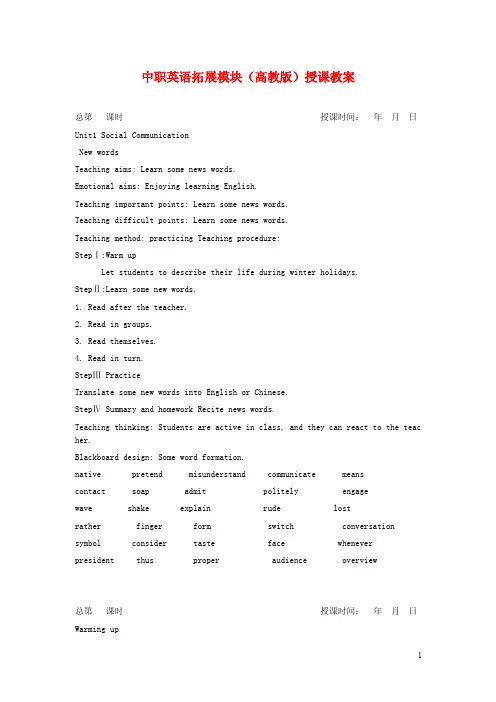
中职英语拓展模块(高教版)授课教案总第课时授课时间:年月日Unit1 Social CommunicationNew wordsTeaching aims: Learn some news words.Emotional aims: Enjoying learning English.Teaching important points: Learn some news words.Teaching difficult points: Learn some news words.Teaching method: practicing Teaching procedure:StepⅠ:Warm upLet students to describe their life during winter holidays.StepⅡ:Learn some new words.1. Read after the teacher.2. Read in groups.3. Read themselves.4. Read in turn.StepⅢ PracticeTranslate some new words into English or Chinese.StepⅣ Summary and homework Recite news words.Teaching thinking: Students are active in class, and they can react to the teac her.Blackboard design: Some word formation.native pretend misunderstand communicate meanscontact soap admit politely engagewave shake explain rude lostrather finger form switch conversation symbol consider taste face whenever president thus proper audience overview总第课时授课时间:年月日Warming upTeaching aims: Learn some news words.Emotional aims: Learn some manners in language communication.Teaching important points: Discuss some questions.Teaching difficult points: Learn some news words.Teaching method: practicing and discussing.Teaching procedure: StepⅠRevisionReview some words.StepⅡ Discussion 讨论课文插图Now look at the picture in the reading text "Etiquette in Language Communic ation".What can you see in it?-From the picture, we can see a woman is talking with a man. But the manlooks a bit uneasy, maybe he is nervous. Obviously it's not a smooth language c ommunication.StepⅢ提示相关生词和短语,如:native speaker, native language, have trouble in doing sth, pretend to do sth, repeat, explain, manner等。
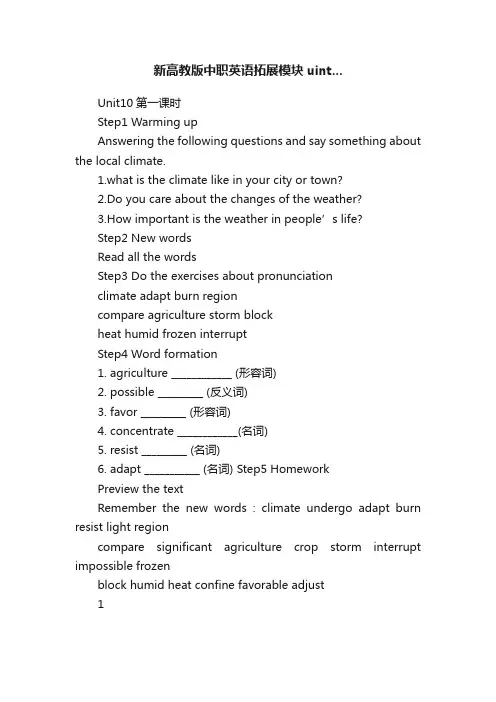
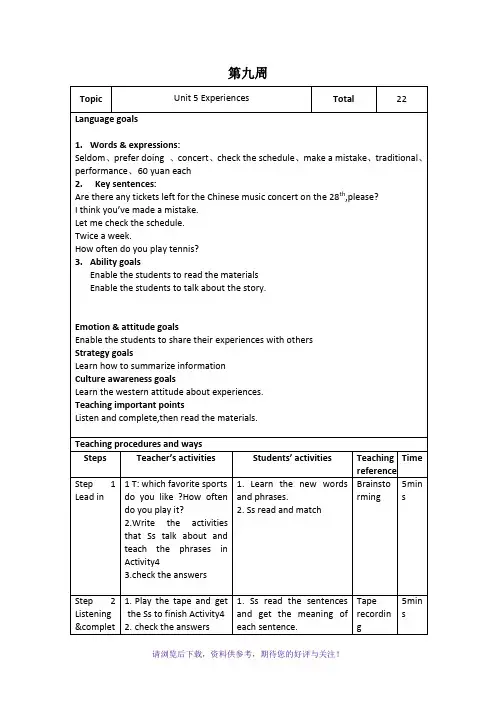
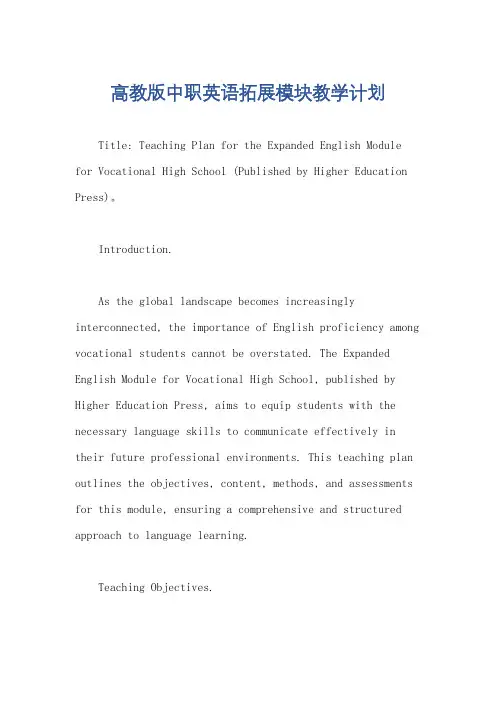
高教版中职英语拓展模块教学计划Title: Teaching Plan for the Expanded English Modulefor Vocational High School (Published by Higher Education Press)。
Introduction.As the global landscape becomes increasingly interconnected, the importance of English proficiency among vocational students cannot be overstated. The Expanded English Module for Vocational High School, published by Higher Education Press, aims to equip students with the necessary language skills to communicate effectively in their future professional environments. This teaching plan outlines the objectives, content, methods, and assessments for this module, ensuring a comprehensive and structured approach to language learning.Teaching Objectives.1. Communication Skills: Enhance students' ability to communicate effectively in English, including speaking, listening, reading, and writing.2. Vocational Vocabulary: Introduce students to industry-specific vocabulary and expressions relevant to their chosen vocational field.3. Cultural Awareness: Foster an understanding of cross-cultural communication norms and practices, enabling students to adapt to diverse work cultures.4. Independent Learning: Encourage students to develop independent learning strategies, including the use of technology and resources outside the classroom.Content Outline.1. Unit 1: Basic Communication Skills.Lesson 1: Introduction to Effective Communication.Lesson 2: Basic Speech Structure and Delivery.Lesson 3: Listening Comprehension Techniques.Lesson 4: Basic Writing Skills for Vocational Settings.2. Unit 2: Vocational Vocabulary and Expressions.Lesson 1: Industry-Specific Vocabulary.Lesson 2: Common Expressions in Vocational Contexts.Lesson 3: Using Vocabulary and Expressions in Situational Dialogs.3. Unit 3: Cross-Cultural Communication.Lesson 1: Understanding Cultural Differences.Lesson 2: Cross-Cultural Communication Strategies.Lesson 3: Role-Playing in Diverse Work Environments.4. Unit 4: Independent Learning Strategies.Lesson 1: Utilizing Technology for Language Learning.Lesson 2: Finding and Evaluating Resources Outside the Classroom.Lesson 3: Developing Personalized Learning Plans.Teaching Methods.1. Interactive Learning: Encourage active participation through group discussions, role-plays, and pair work.2. Technology Integration: Utilize digital tools and platforms to enhance language learning, such as online dictionaries, language exchange platforms, and multimedia resources.3. Cultural Immersion: Incorporate real-world scenariosand case studies to expose students to different work cultures and communication norms.4. Project-Based Learning: Assign projects that require students to apply their language skills to practical situations, such as creating a business proposal or a customer service script.Assessments.1. Formative Assessments: Conduct regular in-class activities and quizzes to monitor students' progress and identify areas for improvement.2. Summative Assessments: Administer end-of-unit tests to assess students' mastery of the content and skills covered in each unit.3. Performance Assessments: Evaluate students' ability to apply their language skills in real-world situations through role-plays, presentations, and project submissions.4. Self-Assessment: Encourage students to reflect on their learning progress and identify areas for self-improvement.Conclusion.The Expanded English Module for Vocational High Schoolis designed to prepare students for the linguistic challenges they will encounter in their future careers. By combining interactive learning methods, technology integration, cultural immersion, and project-based learning, this teaching plan aims to foster a comprehensive and engaging language learning experience that cultivates the skills and confidence necessary for success in the global workplace.。
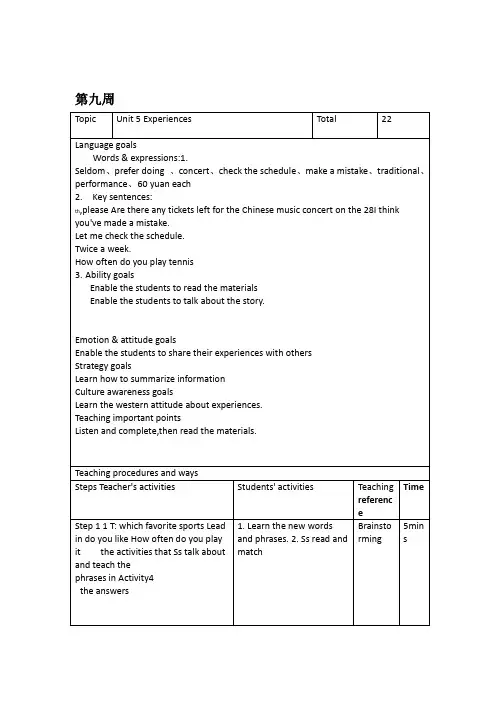
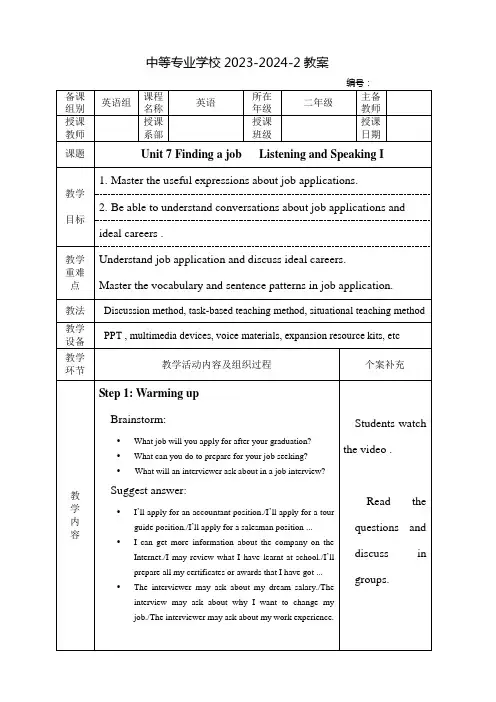
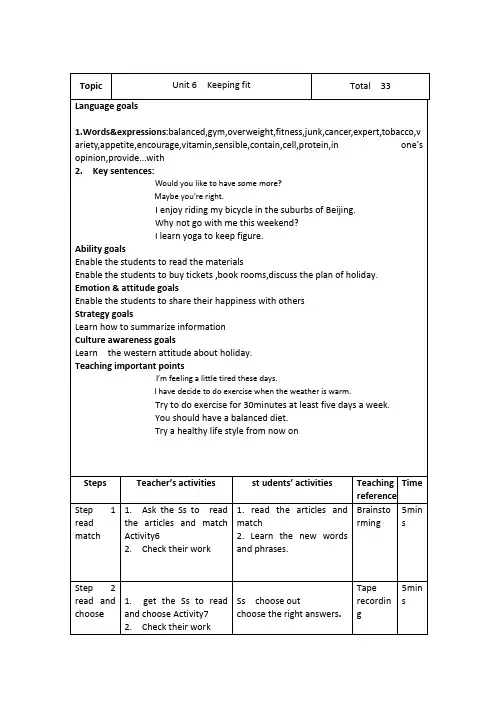
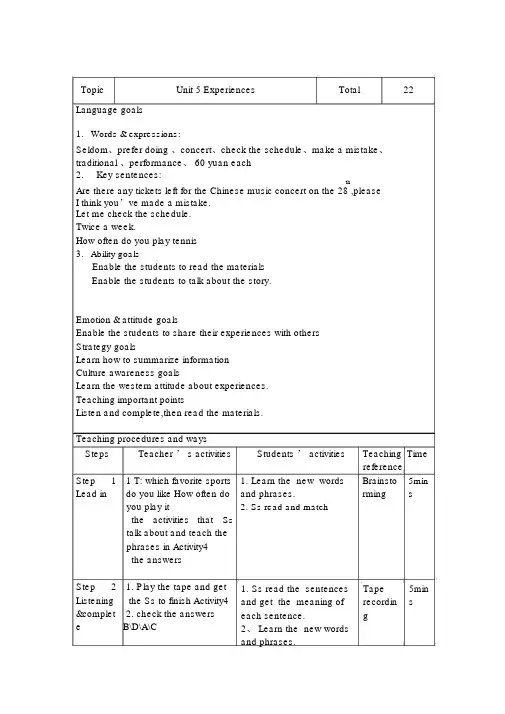
Topic Unit 5 Experiences Total 22 Language goals1.Words & expressions:Seldom、prefer doing 、concert、check the schedule、make a mistake、traditional 、performance、 60 yuan each2.Key sentences:thAre there any tickets left for the Chinese music concert on the 28 ,pleaseI think you’ve made a mistake.Let me check the schedule.Twice a week.How often do you play tennis3.Ability goalsEnable the students to read the materialsEnable the students to talk about the story.Emotion & attitude goalsEnable the students to share their experiences with othersStrategy goalsLearn how to summarize informationCulture awareness goalsLearn the western attitude about experiences.Teaching important pointsListen and complete,then read the materials.Teaching procedures and waysSteps Teacher ’ s activities Students ’ activities Teaching TimereferenceStep 1 1 T: which favorite sports 1. Learn the new words Brainsto5min Lead in do you like How often do and phrases.rming s you play it 2. Ss read and matchthe activities that Sstalk about and teach thephrases in Activity4the answersStep 2 1. Play the tape and get Listening the Ss to finish Activity4 &complet 2. check the answerse B\D\A\C 1. Ss read the sentences Tape 5min and get the meaning of recordin s each sentence. g2、 Learn the new wordsand phrases.Public、 how often 、playtennis 、 seldom、 twice aweek、 love doing、 visitStep 3 1. Look and talk about the Tape 12 Repeat pictures. recordin mins after me 1. Ss repeat after the tape gthe dialog, Ss repeatafter me . retell the dialogStep 4 Ss some questions. Ss answers the questions: Role-pla 10 Act out 2. Walk around the 1.what’s your favorite ying mins classroom and offer help sportsif necessary. 2.How often do you do it3.Why do you love doing itStep 5 Talking about the movie Ss make conversations Role-pla 10 Practice which you have seen last ying mins night.Step 6 Give marks to each Ss talk about their 2 Assessing group. performance mins Homewor Activity8kBlackboard design Unit 5 Period twoPublic What’your favorite sporthow often How often do you do itplay tennis Why do you love doing itSeldomtwice a weeklove doing、 visitSummari The students are very interested in talking about personal hobbies topic。
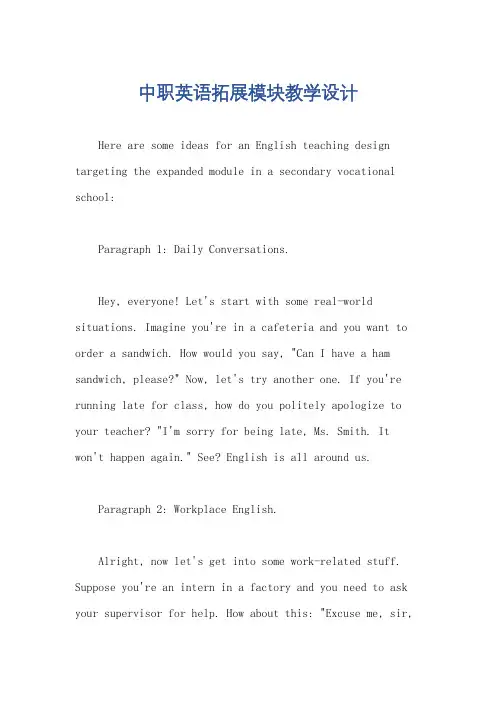
中职英语拓展模块教学设计Here are some ideas for an English teaching design targeting the expanded module in a secondary vocational school:Paragraph 1: Daily Conversations.Hey, everyone! Let's start with some real-world situations. Imagine you're in a cafeteria and you want to order a sandwich. How would you say, "Can I have a ham sandwich, please?" Now, let's try another one. If you're running late for class, how do you politely apologize to your teacher? "I'm sorry for being late, Ms. Smith. It won't happen again." See? English is all around us.Paragraph 2: Workplace English.Alright, now let's get into some work-related stuff. Suppose you're an intern in a factory and you need to ask your supervisor for help. How about this: "Excuse me, sir,could you assist me with this machine? I'm not sure how to operate it." Or, if you're in an office setting and you want to ask for feedback on a project, you could say, "I've finished the report. Would you mind giving it a quick review?"Paragraph 3: Travel & Culture.Traveling abroad? Knowing some basic phrases can be really handy. When checking in at a hotel, remember to say, "Hello, I have a reservation under the name.。